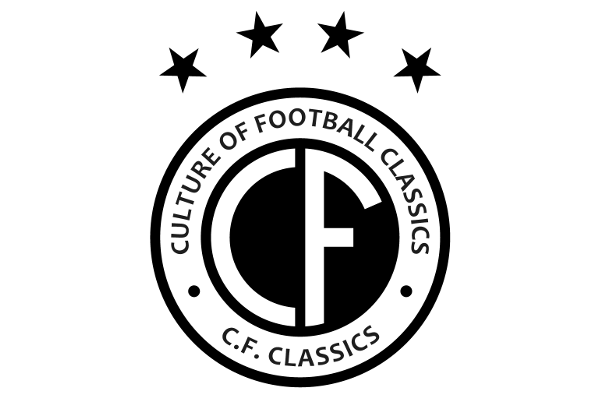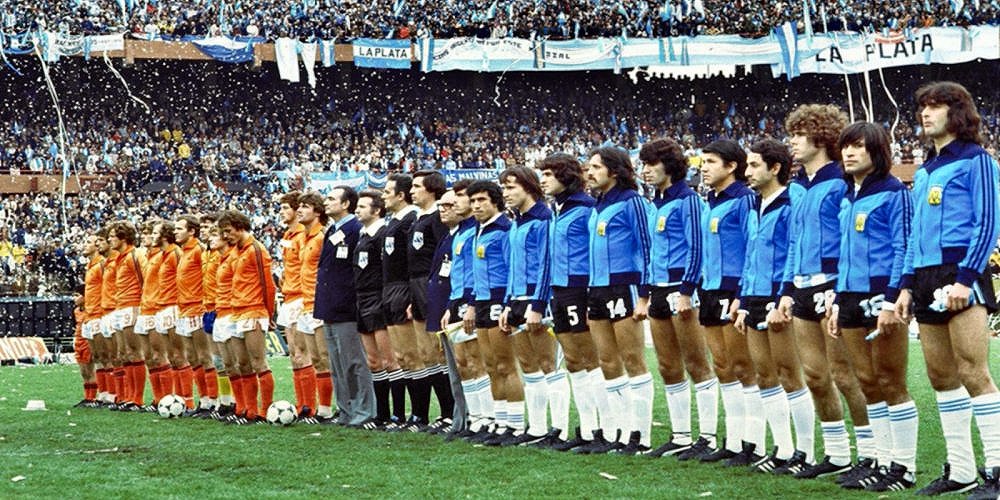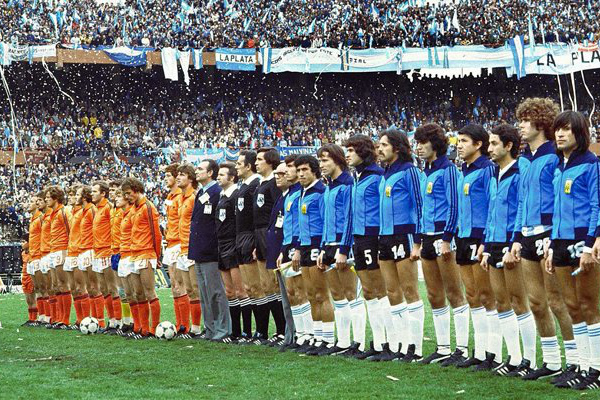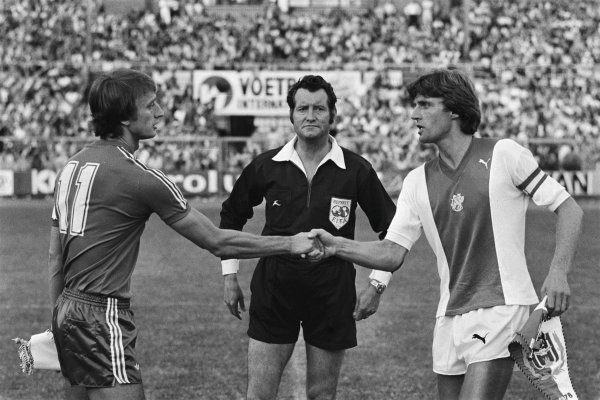The Story of the Netherlands at the 1974 World Cup
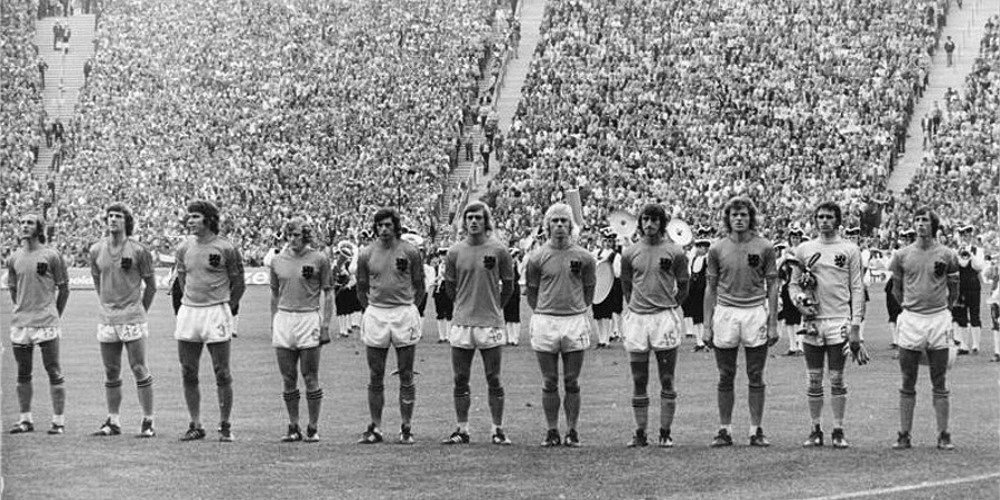
Photo: Wikimedia Commons / Rainer Mittelstädt
The Dutch team of the mid 1970's is one of the most memorable in football history. The revolution of Total Football, the iconic orange and black adidas kit, and a host of stylish world-class players, all combined to make them one of the sport's greatest ever teams.
With many of the Netherlands great players at the height of their footballing powers as the World Cup headed to West Germany in 1974, they were fully expected to justify their tag as one of the tournament favourites. The story of the Netherlands 1974 World Cup campaign has got just about everything, not only did they dazzle the footballing world as they showcased their skills and tactics, but there was also controversy and incident throughout.
PRE-TOURNAMENT CONTROVERSY
František Fadrhonc had been the national coach for the 1974 World Cup qualifying campaign but Barcelona boss Rinus Michels was brought in by the KNVB to take the reigns for the actual tournament. This was much to the delight of Johan Cruyff, who wasn't wholly convinced by the Austro-Hungarian Fadrhonc and his tactics. Michels, on the other hand, he trusted more than anyone, having worked with him at Ajax and followed to Barcelona.
Yet whilst this move appeased Johan Cruyff, the run up wasn't without other controversies and problems. The entire playing squad got into a bitter argument with the KNVB about player bonuses, whilst Cruyff, individually, was involved in the infamous sponsorship issue with the two classic football kit manufacturers, adidas and Puma. The famous Dutch orange shirts were being made by adidas, and their equally famous three-stripes were being run down the arms of the shirts. However, Cruyff had a lucrative boot sponsorship deal with arch-rivals Puma, wearing their Puma Kings, and refused to wear the three-stripes of adidas, his argument being that whilst the KNVB may have a deal with adidas, it was his head sticking out of the shirt and he had a deal with Puma. Incredibly, given the prestige that would come with being World Cup winners kit manufacturers to a team spearheaded by Cruyff, the KNVB and adidas both relented and Cruyff had a special neutral shirt made with just two black stripes on the arm, shorts and even the socks!
As well as the off-field issues, there were also some on-field problems for Michels to resolve.
Firstly, Ajax midfielder Gerrie Muhren was unavailable. A big loss given Muhren's form with Ajax and the fact that he knew Michels, and how to play his Total Football system, as well as anybody. However, the Dutch squad were strong in the midfield area and had plenty of options there.
There was also a huge hole to fill in defence. Ajax's fantastically bearded libero, Barry Hulshoff, had a picked up serious knee injury, whilst Feyenoord stalwart Rinus Israel was now 32 and there were doubts over his fitness after a series of injuries and operations. Bizarrely, they even looked at bringing Hulshoff's Ajax team-mate Horst Blankenburg into the fold. Why was it bizarre? Well, he was actually German. There was talk of fast-tracking Dutch nationality for Blankenburg as he hadn't previously been selected for West Germany. However, Blankenburg said no, and that was that.
Next up, there was the massive issue of the goalkeeping situation. PSV Eindhoven keeper Jan van Beveren had been the number one choice during qualification but had also been injured for the last few matches. Having recovered, he was asked by Michels to prove his fitness by playing in a pre-tournament friendly against Hamburger SV. Van Beveren agreed but said he'd only play one half, resulting in a fall-out with Michels that would see Van Beveren dropped and replaced by 33 year-old Jan Jongbloed, who'd only received one previous cap, way back in 1962. It was widely accepted that Van Beveren, whilst a great shot-stopper, wasn't as good with his feet, and this was one of the reasons Michels was happy to bring in Jongbloed, so he could be used as a sweeper-keeper if required. The fall-out with Van Beveren and his PSV Eindhoven team-mates, who would side with him, would continue to cause problems for some years to come.
Finally, there was the situation that had developed with Cruyff during the previous year at Ajax. It involved a player-vote which had seen one-club-man Piet Keizer handed the club captaincy ahead of Cruyff. This issue was among the reasons for Cruyff heading off to Barcelona to join Michels at the Nou Camp, and the relationship between the two players still wasn't great. Michels knew Cruyff better than anyone and realised that after the Ajax arguments, playing his star man up front with Keizer wasn't going to be ideal heading into the World Cup. So in the run-up Michels looked to change the system to a three-man attack, with Cruyff in a roving role behind Anderlecht's Rob Rensenbrink on the left and 22 year-old Ajax starlet Johnny Rep on the right. So, in the run-up to the tournament, Michels looked to change the system to a three-man attack, with Cruyff playing in a roving role, behind Anderlecht's Rob Rensenbrink, who would start on the left side, and 22 year-old Ajax starlet Johnny Rep on the right side.
So, despite all of the talent at his disposal, there were lots of issues for Michels to contend with before the tournament had even begun.
THE NETHERLANDS 1974 WORLD CUP SQUAD
Here's the list of the 22 players that were picked for the Netherlands 1974 World Cup squad. Notice how the squad was numbered alphabetically by the surnames except for Cruyff, who retained his famous number 14 shirt. So, it wasn't just the stripes on his arms which were different, it was his squad number too.
| No. | Player | Pos | Club | Age | Caps |
|---|---|---|---|---|---|
| 1 | Ruud Geels | MF | Club Brugge | 25 | 3 |
| 2 | Arie Haan | MF | Ajax | 25 | 10 |
| 3 | Willem van Hanegem | MF | Feyenoord | 30 | 29 |
| 4 | Kees van Ierssel | DF | FC Twente | 28 | 4 |
| 5 | Rinus Israël | DF | Feyenoord | 31 | 44 |
| 6 | Wim Jansen | DF | Feyenoord | 27 | 25 |
| 7 | Theo de Jong | MF | Feyenoord | 26 | 8 |
| 8 | Jan Jongbloed | GK | FC Amsterdam | 33 | 2 |
| 9 | Piet Keizer | FW | Ajax | 30 | 33 |
| 10 | René van de Kerkhof | MF | PSV Eindhoven | 22 | 5 |
| 11 | Willy van de Kerkhof | MF | PSV Eindhoven | 22 | 1 |
| 12 | Ruud Krol | DF | Ajax | 25 | 20 |
| 13 | Johan Neeskens | MF | Ajax | 22 | 17 |
| 14 | Johan Cruyff (c) | MF | Barcelona | 27 | 28 |
| 15 | Rob Rensenbrink | FW | Anderlecht | 26 | 13 |
| 16 | Johnny Rep | FW | Ajax | 22 | 5 |
| 17 | Wim Rijsbergen | DF | Feyenoord | 22 | 1 |
| 18 | Piet Schrijvers | GK | FC Twente | 27 | 5 |
| 19 | Pleun Strik | DF | PSV Eindhoven | 30 | 8 |
| 20 | Wim Suurbier | DF | Ajax | 29 | 27 |
| 21 | Eddy Treijtel | GK | Feyenoord | 28 | 4 |
| 22 | Harry Vos | DF | Feyenoord | 27 | 0 |
THE OPENING GROUP
FIFA had decided to spilt up the four opening groups into four teams, one each from Western Europe, Eastern Europe, South America, and the Rest of the World. The Netherlands had been drawn in Group 3, alongside Uruguay, Bulgaria and Sweden, who, for some reason, had been been put in the Rest of the World pot! On paper it looked like a very winnable group - Uruguay and Sweden had only just squeezed through their qualifying campaigns via goal difference and play-off respectively, and Bulgaria had topped a relatively weak qualifying group. It didn't appear that there was too much to fear.
Whilst Johan Cruyff was considered undroppable, there were contrasting fortunes for Johnny Rep and Robbie Rensenbrink in the opening game against Uruguay. Rep had a great start and grabbed both goals as they won 2:0, but Rensenbrink was dropped for the next game against Sweden in favour of Keizer. However, the Ajax man didn't impress in the goalless draw against the Swedes and so Michels again handed Rensenbrink the starting slot in the final group game against Bulgaria.
Needing to win to ensure they went through, Rensenbrink grabbed his opportunity with a fantastic performance as they ripped the Bulgarians apart with a brilliant 4:1 victory. Johan Neeskens opened the scoring early on in the fifth minute with a twice-taken penalty after Cruyff had put the burners on and been brought down from behind. A minute before half-time Rensenbrink put Wim Jansen clean through on goal, he was brought down, and a second penalty was awarded. Neeskens took it again, blasting it into the roof of the net to make it 2:0. Rep scored the game's third goal, and his third of the tournament, after 71 minutes, smashing home a volley after Bulgaria had failed to clear Cruyff's free-kick. Bulgaria pulled one back seven minutes later after a Ruud Krol own-goal, but the Dutch made it 4:1 two minutes before the end, substitute Theo de Jong scoring with a header after a beautiful, nonchalant, curling pass from Cruyff out on the left.
The victory over Bulgaria meant that the Dutch topped Group 3, finishing on five points, one point ahead of the Swedes, who also qualified in second place, with Bulgaria (two points) and Uruguay (one point) both going home.
INTO THE 2ND ROUND...
The 1974 World Cup was the first time that FIFA had decided to adopt a group formula to decide who went through to the actual final. Having topped Group 3, the Netherlands were placed into the second round Group A. Also qualifying from the first round of groups alongside the Netherlands were; East Germany, Argentina and Brazil, the defending World Cup champions. The other group, B, was an all European affair featuring West Germany, Sweden, Poland and Yugoslavia.
The Dutch headed into this next round full of confidence, and the attacking triumvirate of Cruyff-Rensenbrink-Rep didn't look back...
They started with a 4:0 thrashing of Argentina, the Dutch midfield and attack just completely overwhelming Roberto Perfumo's side in Gelsenkirchen. Cruyff opened his goalscoring account for the tournament after eleven minutes when he beautifully controlled a lofted pass, rounded goalkeeper Daniel Carnevali and slotted home. Ruud Krol made it two when he smashed one in from the edge of the box midway through the first half, whilst Johnny Rep scored his fourth goal of the tournament with a fine header from Cruyff's pinpoint left wing cross. Cruyff completed the rout himself, volleying in a rebound from a tight angle after Wim van Hanegem's shot had been saved.
Next up were the East Germans. They'd shocked the footballing world by beating their neighbours and hosts, West Germany, 1:0 in the final game of the first round, meaning that they'd finished top of Group 1. As in the previous game against Argentina, the Dutch started really strongly and took another early lead, Neeskens slamming in his third goal of the tournament after seven minutes following a penalty box melee. Rensenbrink finally scored his first goal of the tournament on the hour mark, guiding a lovely left foot shot into the corner of the net to make it 2:0.
The victory over the East Germans setup a group decider against Brazil, who'd also won their two opening group games, beating East Germany 1:0 and deadly rivals Argentina 2:1. The match had all the makings of an absolute classic. Brazil, the reigning champions, still remembered for their beautiful football from 1970, against the new kids on the block - the Total Football of the Netherlands.
However, Brazil's beautiful football of Mexico '70 seemed a distant memory, as it soon became apparent that they'd turned up for a physical battle, rather than a test of skills. The Brazilians made it to half-time with the game still poised at 0:0, but five minutes into the second half the two Johan's, Cruyff and Neeskens, combined superbly for the latter to score with a brilliant lobbed finish. Fifteen minutes later, Rensenbrink setup Cruyff, and he made it two-nil with a superb side-foot effort. That was it, game over, as an increasingly frustrated Brazil then seemed more intent on kicking lumps out of the Dutch than trying to play their way back into the match. However, the match ended badly for Rensenbrink as he was forced off with a leg injury shortly after setting up Cruyff's goal.
THE FINAL
With no semi-finals, the victory over Brazil meant that the Netherlands topped the group and qualified for a mouth-watering final against arch-rivals West Germany. The hosts had won Group B, but it had been tight. Poland had come from nowhere to become one of the teams of the tournament, their line-up containing a golden generation of footballers who would go on to become some of the greatest Polish footballers of all-time. Both West Germany and Poland had won their opening two matches against Sweden and Yugoslavia, so they went into the final match in exactly the same scenario as the Netherlands and Brazil, effectively a winner-takes-all match for a place in the final. It was a match too far for Poland though, and West Germany managed to find a way, Gerd Müller scoring with fourteen minutes to go at the Waldstadion in Frankfurt, sending the host nation through to the final.
Switching back to the Netherlands and, with just three full days to rest before the final, the Dutch coaching and medical staff worked intensively to try and get Rensenbrink as fit as possible, Michels knowing how successful the attacking trio of Cruyff, Rensenbrink and Rep had become. The medical team eventually gave Rensenbrink the all clear to play in the final, meaning that Michels could pick the same team that had played against Brazil;
The final was played on the 7th of July at the Olympiastadion, Munich. As well as home advantage, West Germany had plenty of stars of their own; Goalkeeper Sepp Maier was considered one of the world's best, captain Franz Beckenbauer had been marshalling the defence superbly, whilst up front their was no-one better than Gerd Müller.
The Dutch were the clear favourites though, and after just one minute this tag looked completely justified as they immediately strung together fifteen passes from the kick off and won a penalty - Uli Hoeness ending Cruyff's fine solo run by bringing him down in the box. Neeskens stepped up and smashed the resulting penalty straight down the middle to make it 1:0. The West Germans were yet to touch the ball!
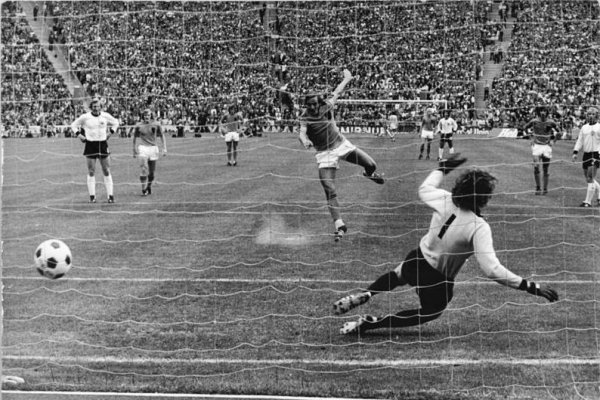
Neeskens lashes home the penalty before West Germany have even touched the ball.
Photo: Wikimedia Commons / Rainer Mittelstädt
The Dutch remained well on top, almost toying with the Germans for the next twenty minutes. In the years to follow this is something that they received criticism about from some quarters, that they were more bothered about trying to humiliate the West Germans by playing keep-ball rather than pushing home their advantage and getting at least another goal. It was a dangerous game, and as is seen so often in football it was punished, as halfway through the first half the Germans got a lifeline; a fine surging run from left winger Bernd Hölzenbein was brought to a halt with a clumsy foul by Wim Jansen. It was a contentious decision by English referee Jack Taylor and the Dutch argued strongly that Hölzenbein hadn't been touched, but Taylor wasn't going to change his mind amidst their appeals. Jongbloed didn't move as Paul Breitner tucked his penalty to the left. Somehow the Germans were level, and now they were on the front foot as the Dutch seemed completely rocked by the penalty. West Germany's decision to try and man-mark Cruyff was also starting to work. Their right back Berti Vogts had been given the task of shadowing him, apparently because he'd done it once before at a youth tournament! Vogts was proving very effective, especially considering that he'd received a yellow card after only four minutes, so he was having to be really careful not to get a second. Incredibly, despite being given the most defensive role on their team, Vogts nearly put the Germans ahead, Jongbloed having to make a great save after a fine one-two from the German fullback. Uli Honess then caused havoc with a great run into the box, whilst Beckenbauer came very close with an audacious, cheeky chipped free-kick. The Dutch were holding on by the skin of their teeth but managed a dangerous breakaway of their own as Rep's shot was saved by Maier as he rushed off his line.
With only two minutes to go until half-time, and just as it seemed that the Netherlands would get to the interval and clear their heads, West Germany took the lead. In what was to be his last ever international match, the great Gerd Müller scored a goal that would just about sum up his incredible goal-poaching ability. A fantastic penetrating run and piece of skill down the right flank by Rainer Bonhof saw the ball passed into Müller just outside the six yard box. With his back to goal, Müller swivelled on a sixpence and then immediately found the net. It's a really underrated goal, and it was about as Gerd Müller as a goal could possibly be.
The Dutch players trudged back to the changing rooms 2:1 down, Cruyff was yellow carded as they walked off as he continued to complain to Jack Taylor about the penalty.
The Dutch needed to get their heads straight and get a grip on the game again. More bad news followed as it became apparent during the interval that the Rensenbrink gamble hadn't paid off, he clearly wasn't his usual free-flowing self and was replaced by René van de Kerkhof. The break was just what the Dutch needed, and they came out for the second half with more purpose.
First of all Breitner had to head off his line from a corner, then Rep and Van Hanegem both went agonisingly close. However, when the Netherlands efforts were on target Sepp Maier was stopping everything that was thrown at him. If there'd been a kitchen sink hurled at him then he'd have somehow kept that out too. Johnny Rep went close again, at full stretch he pulled his effort narrowly wide, whilst Neeskens hammered in a shot from the edge of the box but it was just the wrong side of the post. And that was the last effort that really troubled Maier's goal. West Germany, masterminded by their manager Helmut Schön, had played a magnificent game, especially considering that early setback, and had managed to nullify the really free-flowing football that we'd seen from Cruyff and the Netherlands for the rest of the tournament.
It was a disappointing end for the Netherlands, made all the worse as it was against their biggest rivals. Johan Cruyff was named in the team of the tournament, alongside fellow team-mates Rob Rensenbrink, Johan Neeskens and Ruud Krol.
So, whilst ultimately they didn't win the World Cup, the Netherlands team of 1974 remain one of the all-time favourites of many football fans, with a real legacy and love that's not found amongst many of the teams that actually went on to lift the trophy.
Not just one of the greatest teams never to win the World Cup, but also one of the world's greatest ever teams.
Tweet
